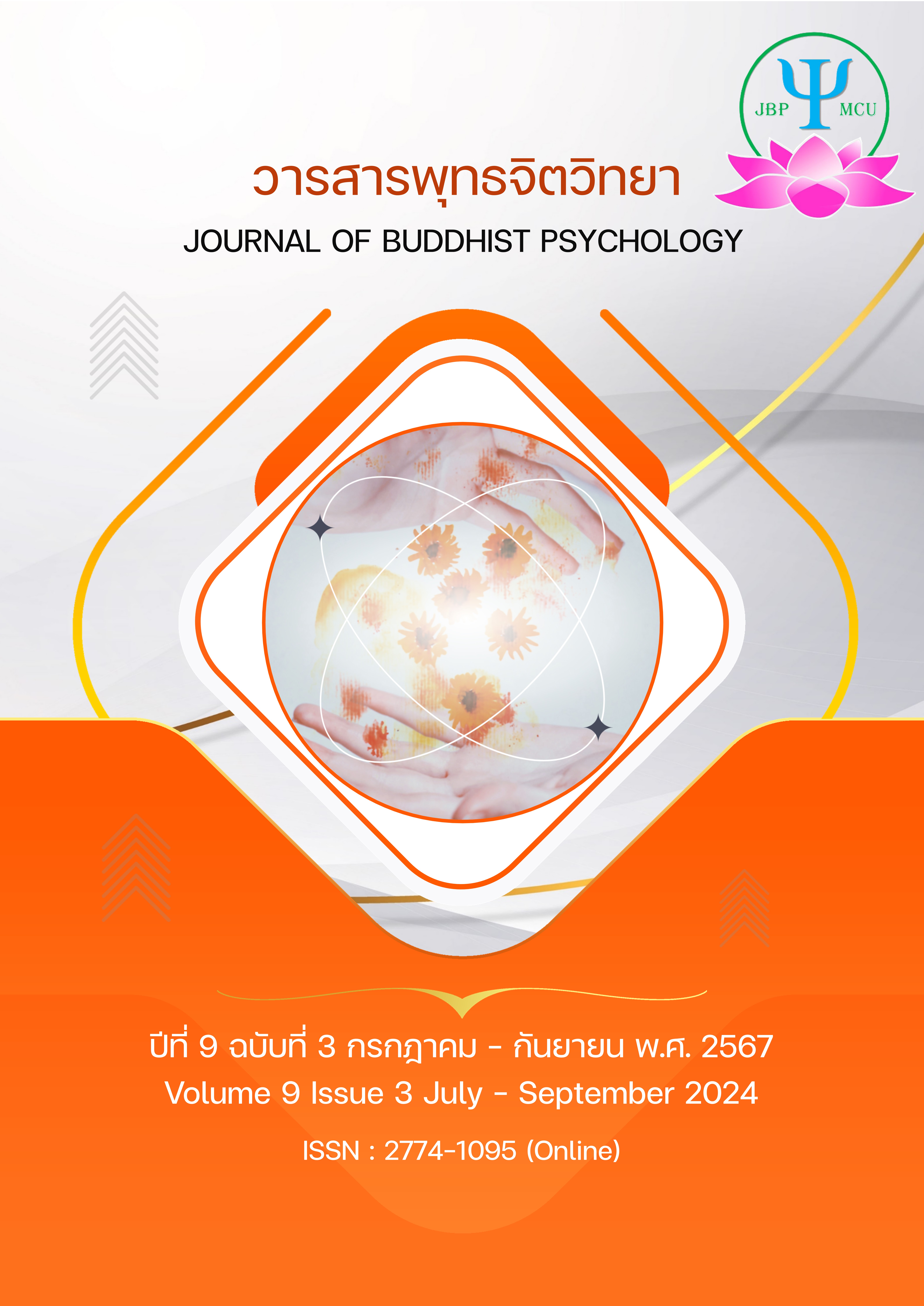รูปแบบการเสริมสร้างสติและการเห็นคุณค่าในตนเองเพื่อความสุขของผู้สูงอายุในสังคมไทย
Main Article Content
บทคัดย่อ
บทความวิจัยนี้มีวัตถุประสงค์ 1) เพื่อศึกษาคุณลักษณะที่เสริมสร้างความสุขตามหลักพุทธจิตวิทยาสำหรับผู้สูงอายุในสังคมไทย 2) เพื่อสร้างรูปแบบการพัฒนาสติและการเห็นคุณค่าในตนเองตามหลักพุทธจิตวิทยาเสริมสร้างความสุขของผู้สูงอายุในสังคมไทย และ 3) เพื่อนำเสนอรูปแบบการพัฒนาสติและการเห็นคุณค่าในตนเองตามหลักพุทธจิตวิทยาเสริมสร้างความสุขของผู้สูงอายุในสังคมไทย เป็นการวิจัยเชิงคุณภาพใช้การสัมภาษณ์เชิงลึกโดยเก็บข้อมูลจากผู้ให้ข้อมูลสำคัญ จำนวน 17 รูปหรือคน และการจัดสนทนากลุ่มเฉพาะ โดยผู้เชี่ยวชาญและผู้ทรงคุณวุฒิที่เกี่ยวข้อง จำนวน 17 รูปหรือคน รวมถึงการจัดประชุมผู้เชี่ยวชาญพิเศษเพื่อให้การรับรองรูปแบบงานวิจัยอีกจำนวน 9 รูปหรือคน ผ่านกระบวนการวิเคราะห์สังเคราะห์ด้วยเครื่องมือทางระเบียบวิธีวิจัยที่ได้รับการยอมรับ
ผลการวิจัย พบว่า 1. ปัจจัยที่เสริมสร้างความสุขตามหลักพุทธจิตวิทยาสำหรับผู้สูงอายุในสังคมไทยโดยรวมของผู้สูงอายุ ได้แก่ หลักพุทธธรรม คือ สติปัฎฐาน 4 และภาวนา 4 และทฤษฎีจิตวิทยา คือ ทฤษฎีแนวคิดเชิงบวก PERMA Model และทฤษฎีจิตวิทยาการเห็นคุณค่าในตนเองของ Cooper smith ที่มีความสอดคล้องและเหมาะสมกับการเสริมสร้างสติและการเห็นคุณค่าในตนเองเพื่อความสุขของผู้สูงอายุในสังคมไทย ใน 4 ด้านคือ ด้านร่างกาย ด้านจิตใจ ด้านสังคม และด้านสติปัญญา 2. รูปแบบการเสริมสร้างสติและการเห็นคุณค่าในตนเองเพื่อความสุขของผู้สูงอายุในสังคมไทย เป็นการสร้างรูปแบบการเสริมสร้างสติและการเห็นคุณค่าในตนเองเพื่อความสุขของผู้สูงอายุในสังคมไทย โดยการบูรณาการ ๓ หลักพุทธธรรม ทฤษฎีจิตวิทยา และแนวคิดเกี่ยวกับผู้สูงอายุในสังคมไทย เรียกว่า รูปแบบ “LOVES Model” ประกอบด้วยองค์ประกอบสำคัญ 6 ประการ คือ 1) ชื่อรูปแบบ 2) หลักการและเหตุผล 3) วัตถุประสงค์ 4) เนื้อหาของรูปแบบ 5) การนำรูปแบบไปใช้งาน และ 6) การติดตามและประเมินผลเนื้อหารูปแบบ ซึ่งส่งผลต่อ
การเสริมสร้างสติและการเห็นคุณค่าในตนเองเพื่อความสุขของผู้สูงอายุในสังคมไทยอย่างแท้จริง 3. การนำเสนอรูปแบบการเสริมสร้างสติและการเห็นคุณค่าในตนเองเพื่อความสุขของผู้สูงอายุในสังคมไทย ที่เรียกว่า รูปแบบ “LOVES Model” ประกอบด้วย 1) L - Lifelong learning การเรียนรู้ตลอดชีวิต 2) Opportunity การเห็นโอกาสทุกชั่วขณะ 3) V – Value การเห็นคุณค่าในตนเอง 4) E – Equality in life การมีประสิทธิภาพในการดำเนินชีวิต 5) S - Self-Esteem การเห็นคุณค่าในตนเอง และการเคารพนับถือตนเอง
Article Details

อนุญาตภายใต้เงื่อนไข Creative Commons Attribution-NonCommercial-NoDerivatives 4.0 International License.
เอกสารอ้างอิง
พระพรหมคุณาภรณ์ (ป.อ. ปยุตโต). (2550). ธรรมะสำหรับผู้สูงอายุ. กรุงเทพฯ: ธรรมสภา.
พระครูวินัยธรอำนาจ พลปญโญ (สวัสดี). (2561). รูปแบบการพัฒนาสุขภาพจิตของผู้สูงอายุตามหลักพุทธธรรม: กรณีศึกษาตำบลบ้านปรือ อำเภอกระสัง จังหวัดบุรีรัมย์. วารสารวิจัย และพัฒนามหาวิทยาลัยราชภัฏบุรีรัมย์, 13(2), 83.
พระครูปริยัติธรรมวิบูล. (2560). รูปแบบการเสริมสร้างความผาสุกทางจิตวิญญาณของผู้สูงอายุตามหลักพุทธจิตวิทยา (วิทยานิพนธ์พุทธศาสตรดุษฎีบัณฑิต). มหาวิทยาลัยมหาจุฬาลงกรณราชวิทยาลัย.
ภิรมย์ เจริญผล. (2553). ศึกษาวิเคราะห์หลักพุทธธรรมที่ใช้ในการดำเนินชีวิตของผู้สูงอายุ: กรณีศึกษาผู้สูงอายุในสถานสงเคราะห์จังหวัดนครปฐม (วิทยานิพนธ์พุทธศาสตรมหาบัณฑิต). มหาวิทยาลัยมหาจุฬาลงกรณราชวิทยาลัย.
นนทรี วงษ์วิจารณ์ และสุปาณี สนธิรัตน์. (2556). ทัศนคติต่อการเป็นผู้สูงอายุการดูแลตนเองทักษะทางสังคม และความผาสุกในชีวิตของสมาชิกชมรมผู้สูงอายุ อำเภอกบินทร์บุรี จังหวัดปราจีนบุรี. วารสารสังคมศาสตร์และมนุษยศาสตร์ มหาวิทยาลัยเกษตรศาสตร์, 39(2), 66-79.
สุกัญญา วชิรเพชรปราณี, (2553), บทบาทผู้สูงอายุที่อยู่กับครอบครัวอย่างมีสุขในชุมชนกึ่งเมือง จังหวัดนครราชสีมา, วารสารวิทยาลัยพยาบาลบรมราชชนนี นครราชสีมา, 16(1), 51-59.
ศศิพัฒน์ ยอดเพชร และคณะ (2552) ตัวแบบการสร้างความสุขให้กับผู้สูงอายุที่ดีของครอบครัวและชุมชนในชนบทไทย. วารสารพฤฒาวิทยาและเวชศาสตร์ผู้สูงอายุ, 10(3), 13-24.


